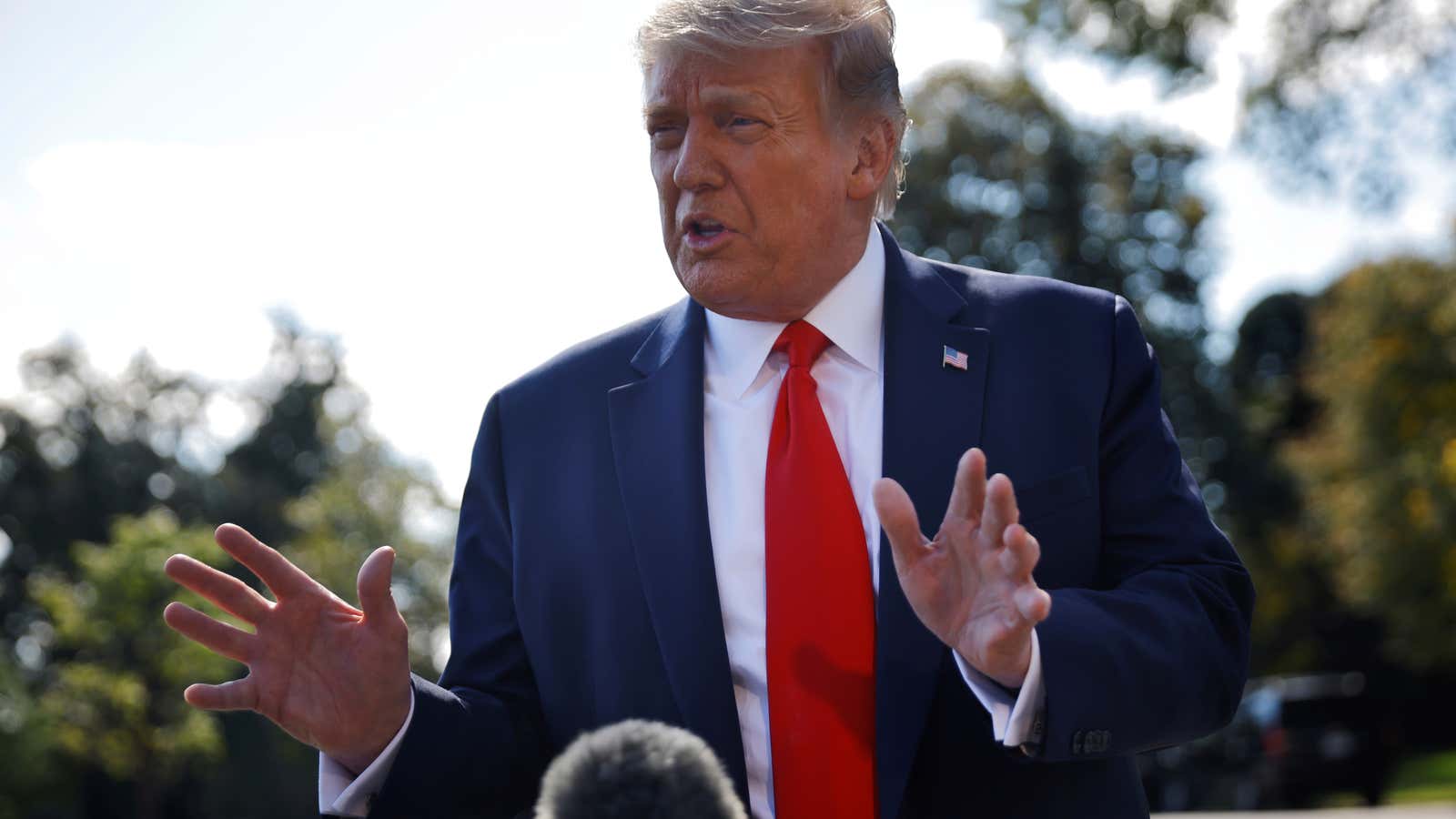Late on Thursday (Oct. 1), president Donald Trump tested positive for Covid-19, making him the eighth world leader to become infected. US efforts to contain the virus with mask requirements and lockdown orders, as well as plans to expand testing and prepare hospitals, have largely fallen to states in the absence of a cohesive national strategy.
But that could change with Trump’s positive test. Contracting a communicable disease could have psychological impacts that change how people view and manage risk. For leaders who have recovered from Covid-19, the disease has had a minor but notable effect on their strategy for fighting the spread of the virus.
When UK prime minister Boris Johnson was diagnosed on Mar. 27, the country was already in lockdown. In the months since his recovery, he has shown a reluctance to ease social distancing rules. He’s said that the illness made him more cautious about reopening. Johnson also seems more credulous (and appreciative) of medical experts, encouraging Brits to “follow the rules” around social distancing guidelines, in stark contrast to Trump’s contrarian advice towards strategies like wearing masks.
In the short term, recovering from a communicable disease could make a person feel guilty or angry for their own infection or others’, and vulnerable around other people, says Karla Vermeulen, the deputy director of the Institute for Disaster Mental Health at SUNY New Paltz.
It’s unclear, though, whether Johnson’s caution had reduced Covid-19’s impact on the country. The UK has the 14th highest number of Covid-19 infections in the world, and has the world’s second highest per capita mortality rate, according to official counts. More recent policies intended to boost economic recovery, like the “eat out to help out” strategy, may have driven new infections.
Johnson’s experience could benefit the UK’s public health policy beyond its fight against Covid-19, however. In July, the prime minister launched an anti-obesity campaign; he’s taking steps to improve his own health, which he blames for the severity of his infection (he spent three nights in the intensive care unit).
Brazil’s president Jair Bolsonaro also had Covid-19, albeit much later in the trajectory of the pandemic, in July. Like Trump, Bolsonaro had also underplayed the effects of Covid-19, opposing lockdowns and calling the viral disease a “little cold.” Medical experts urged him to change course. He had mostly mild symptoms for a little over two weeks, testing negative in late July.
In the months since, Bolsonaro has taken a more measured tone about the virus, pushing for aid packages that have contributed to a rise in his popularity. But it’s not clear that Bolsonaro’s sickness has resulted in substantive health policy changes; to date the country has the world’s third highest number of cases and the second highest number of deaths.
Honduran president Juan Orlando Hernández emerged more empathetic after his recovery from Covid-19, though that has not necessarily been reflected in new policy. When he was discharged from the hospital in July, he honored the victims of the disease and emphasized its severity. Other world leaders who have tested positive for Covid-19 include: Guatemala’s president Alejandro Giammattei, Bolivia’s interim president Jeanine Añez, Belarusian leader Alexander Lukashenko, Armenian prime minister Nikol Pashinyan, and Russian prime minister Mikhail Mishustin. None have died.
For the US, it’s late for a cohesive national strategy to fight Covid-19, but it’s never too late, says Howard Koh, a professor at the Harvard T. H. Chan School of Public Health. Mask requirements and social distancing rules have been unevenly applied around the country; national policies could save tens of thousands of lives in the coming months. Putting science and top health officials front and center to communicate this policy to the public could reduce the corrosive effect of partisanship on the public health strategy.
“It’s too easy to say Covid is a problem that affects other people and not me,” Koh says. That changes once someone is infected.
But Vermeulen is skeptical that Trump’s experience will change his policy. “I’m not very optimistic that [Trump] will learn any positive lessons about susceptibility and the need to protect citizens, the way Boris Johnson seemed to (to some degree),” Vermeulen says. “It would be refreshing to see him actually change his perspective and acknowledge that the pandemic is a vital threat to all US citizens, and to the rest of the world.”
“I’m hoping as distressing and difficult as this is, it can serve as as wake up call for our country,” Koh says. “Public health is about what do we do together understanding everyone is vulnerable, our health is our most precious gift. That’s what empathy is all about, understanding that everyone is vulnerable.”




